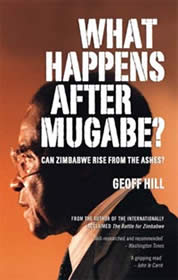| |
Back to Index
Book
review: What Happens After Mugabe?: Can Zimbabwe Rise From the Ashes?
by Geoff Hill
ZW News
May 02,
2006
http://www.zwnews.com/issuefull.cfm?ArticleID=14281
Those who
are being asked to pay for the bridges should consider the uncomfortable
questions in this book - if they want those bridges to last, and
before they sign the cheques
  Consider
this scenario: After six years of open conflict, a deeply unpopular
administration, short of both cash and ideas and aided and abetted
by the South African government, seeks an accommodation with the
West. Power will shift, they say, and we will bring the opposition
into government. In return, they demand, we need huge amounts of
money to flow from the IMF, the World Bank, and your taxpayers,
to rebuild the shattered economy. Not 1979. Not Smith, Muzorewa
and the short-lived jurisdiction of Zimbabwe-Rhodesia. Rather, Zimbabwe
in 2006. The Mujurus replace Mugabe. Tsvangirai is offered a vice-presidency.
Power appears to shift and balance-of-payments support and donor
aid again begins to flow. In the last few weeks, there has been
claim and counter-claim about "bridge building". The government,
bankrupt and floundering, claims they are trying to build bridges.
The US ambassador, the new British and Swedish ambassadors, the
EU commissioner for Aid and Development, and the IMF have all in
played down the possibility of any policy change. But, whatever
the details of the negotiations, one can almost smell a Diplomatic
Initiative on the move. The language we have heard from both sides
is that of the relationship counsellor’s office, not the divorce
court. Consider
this scenario: After six years of open conflict, a deeply unpopular
administration, short of both cash and ideas and aided and abetted
by the South African government, seeks an accommodation with the
West. Power will shift, they say, and we will bring the opposition
into government. In return, they demand, we need huge amounts of
money to flow from the IMF, the World Bank, and your taxpayers,
to rebuild the shattered economy. Not 1979. Not Smith, Muzorewa
and the short-lived jurisdiction of Zimbabwe-Rhodesia. Rather, Zimbabwe
in 2006. The Mujurus replace Mugabe. Tsvangirai is offered a vice-presidency.
Power appears to shift and balance-of-payments support and donor
aid again begins to flow. In the last few weeks, there has been
claim and counter-claim about "bridge building". The government,
bankrupt and floundering, claims they are trying to build bridges.
The US ambassador, the new British and Swedish ambassadors, the
EU commissioner for Aid and Development, and the IMF have all in
played down the possibility of any policy change. But, whatever
the details of the negotiations, one can almost smell a Diplomatic
Initiative on the move. The language we have heard from both sides
is that of the relationship counsellor’s office, not the divorce
court.
Those who are the targets of the government’s current advances could
do a lot worse than read What happens after Mugabe?, by veteran
southern African reporter Geoff Hill. A companion to his 2003 book,
The Battle for Zimbabwe, this volume peers beyond the horizon, at
what would be needed to rebuild the country once Mugabe’s reign
ends. Hill is not as pessimistic as one might expect, considering
the descriptions he gives of the extent of the damage wreaked by
six years of what can only accurately be described as civil war.
He enumerates, in detail, the complete hollowing out of the education
and health systems, and the wholesale destruction of the agricultural
sector. He sets out the process by which the justice system has
been suborned and perverted. Yet, without being prescriptive, he
finds examples from around the world that might serve as models
for rebuilding these institutions.
But the real value of his book lies in its latter chapters. Firstly
Hill raises the issue of the Zimbabwean diaspora. The huge emigration
of Zimbabweans since 2000, by some reckonings as much as a quarter
of the population, represents the accumulated investment in education
and training of a quarter of a century. Each year these exiles stay
abroad, they become less like exiles and more like immigrants. Each
successive year they become less likely to return. Squaring this
particular circle will require the wisdom of Solomon. Secondly,
he discusses the need for justice for those who have been the victims
of Mugabe’s rule since independence. Those with only passing contact
with Matabeleland often find it difficult to believe how ingrained
in the social fabric is the need for a public acknowledgement of
what happened during Gukurahundi. To those thousands of families
can now be added those who lost their livelihoods during the farm
invasions (who by far out-number the beneficiaries of resettlement),
the thousands of victims of political violence, as well as the 700
000 who lost their homes during Murambatsvina. Mugabe was able to
make nefarious use of the lingering resentment over land in order
to prop up his regime in 2000. How much future mischief lies in
store if the grievances over Gukurahundi and Murambatsvina are not
dealt with. An acceptable form of justice is not just morally desirable,
but politically imperative.
Hill does not claim to provide the answers. But those who are being
asked to pay for the bridges should consider the uncomfortable questions
in this book - if they want those bridges to last, and before they
sign the cheques.
*What Happens After Mugabe?: Can Zimbabwe Rise From the Ashes? by
Geoff Hill is published by Zebra Press. ISBN: 1-77007-102-4
Please credit www.kubatana.net if you make use of material from this website.
This work is licensed under a Creative Commons License unless stated otherwise.
TOP
|

